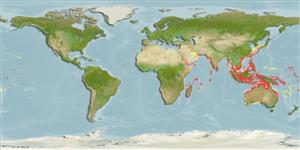أشلاق (القروش و الشفانين) (sharks and rays) >
Myliobatiformes (Stingrays) >
Dasyatidae (Stingrays) > Urogymninae
Etymology: Himantura: Greek, iman, imantos = thong, strap + Greek, oura = tail (Ref. 45335).
More on author: Gmelin.
Environment: milieu / climate zone / depth range / distribution range
البيئة
بحري; مياه مخلوطة مرتبطة بالشعاب; مهاجرة بين الياه الملحه و الحلوة لكن ليس للتزاوج (Ref. 51243); نطاق العمق 20 - 50 m (Ref. 28016). Subtropical; 23°C - 26°C (Ref. 12468); 38°N - 37°S, 34°E - 149°W
Indo-Pacific: Persian Gulf (Ref.80050); Red Sea (and eastern Mediterranean via Suez Canal) to southern Africa and French Polynesia, north to Taiwan, south to Australia. Also in the Arafura Sea (Ref. 9819). Collected from the estuary of the River Ganges (Ref. 33178). This name has been used for a number of similar spotted species (Ref. 6871). Probably a species complex (Ref. 35766). Its identity has been confused in many publications and Micronesian specimens should be re-examined (Ref. 37816).
Length at first maturity / الحجم / وزن / العمر
Maturity: Lm 83.0, range 82 - 84 cm
Max length : 200 cm WD ذكر/ مختلط الجنس; (Ref. 3263); common length : 45.0 cm TL ذكر/ مختلط الجنس; (Ref. 5450); أعلا وزن تم نشرة: 150.0 kg (Ref. 124786)
الأشواك الظهرية (المجموع) : 0; شوكة شرجية: 0. Huge stingray with conspicuous dark spots on a light brown disc; spots well-spaced in young but crowded to form reticulated pattern in adult; white ventrally; tail marked with bands of black and white; snout sharply pointed; disc with narrowly rounded outer corners, and tail long, slender and nearly three times body length when intact, with no caudal finfolds; disc without thorns but with band of flat denticles along midback (in adults); usually 1 medium-sized sting on tail (Ref. 5578).
Common off sandy beaches and in shallow estuaries and lagoons; also found in sandy areas of coral reefs (Ref. 9710). Also offshore down to 50 m depth (Ref. 5578). May enter fresh water (Ref. 5578). Feeds on small fishes, bivalves, crabs, shrimps, worms (Ref. 3263) and jellyfishes (Ref. 37816). Ovoviviparous (Ref. 50449). Common catch of the demersal tangle net, bottom trawl, longline and beach seine fisheries (Ref.58048). Popular angling fish (Ref. 3263). Not esteemed as a food fish (Ref. 3263). Used in Chinese medicine (Ref. 12166). Tail is used as It is parasitised by the monogeneans Dendromonocotyle colorni and Dendromonocotyle ukuthena on the dorsal skin surface (Ref. 124058).
Exhibit ovoviparity (aplacental viviparity), with embryos feeding initially on yolk, then receiving additional nourishment from the mother by indirect absorption of uterine fluid enriched with mucus, fat or protein through specialised structures (Ref. 50449). Distinct pairing with embrace (Ref. 205). Distinct pairing with embrace (Ref. 205). Bears 3 to 5 young in the summer (Ref. 5578). Size at birth about 21 (Ref.58048) - 28 cm WD (Ref. 6871).
Fricke, R., 1999. Fishes of the Mascarene Islands (Réunion, Mauritius, Rodriguez): an annotated checklist, with descriptions of new species. Koeltz Scientific Books, Koenigstein, Theses Zoologicae, Vol. 31:759 p. (Ref. 33390)
IUCN Red List Status (Ref. 130435)
استخدامات بشرية
مصائد: تجاري; لعبة سمكه: نعم; حوض مائي: تجاري
أدوات
تقارير خاصة
Download XML
مصادر علي الأنترنت
Estimates based on models
Preferred temperature (Ref.
123201): 24.2 - 28.6, mean 27.8 °C (based on 334 cells).
Phylogenetic diversity index (Ref.
82804): PD
50 = 0.5000 [Uniqueness, from 0.5 = low to 2.0 = high].
Bayesian length-weight: a=0.01698 (0.00840 - 0.03434), b=3.17 (2.98 - 3.36), in cm total length, based on LWR estimates for this species & (Sub)family-body (Ref.
93245).
مستوى غذائي (Ref.
69278): 3.6 ±0.6 se; based on diet studies.
المرونه (Ref.
120179): منخفظ جدا, الحد الزمني الأدني لتضاعف عدد أفراد المجتمع أكثر من 14 سنة (Fec=3-5).
Fishing Vulnerability (Ref.
59153): Very high vulnerability (90 of 100).
Nutrients (Ref.
124155): Calcium = 3.06 [0.35, 48.42] mg/100g; Iron = 0.343 [0.028, 3.859] mg/100g; Protein = 22.3 [19.6, 25.0] %; Omega3 = 0.113 [0.036, 0.335] g/100g; Selenium = 15.7 [2.7, 86.6] μg/100g; VitaminA = 10.9 [0.9, 124.7] μg/100g; Zinc = 0.504 [0.035, 5.570] mg/100g (wet weight);
